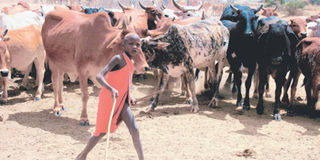TURKANA: Kenya, Ethiopia sign peace deal to end cattle rustling

A young man herds cattle in Baringo. The protracted armed conflicts among pastoralists from Kenya and Ethiopia is set to be resolved following signing of a peace agreement to contain further cattle raids and mutual sharing of natural resources. Photo/FILE
The protracted armed conflicts among pastoralists from Kenya and Ethiopia is set to be resolved following signing of a peace agreement to contain further cattle raids and mutual sharing of natural resources.
Pastoralists from the two countries resolved to return stolen animals to rightful owners and form peace committees comprising of community leaders and provincial administrators to contain what they termed as 'commercialised’ cattle rustling activities.
The resolution was made following a peace meeting that culminated in the release of four Kenyans including a child who had been held hostage in Ethiopia as a condition for the return of stolen animals by Turkana herdsmen following attack at a village in the neighbouring country.
The hunger stricken family had gone to Kangaten village in Ethiopia in search of food when armed Turkana raiders attacked the area and made away with about 100 goats.
They were released after the stolen animals were recovered and handed over to their rightful owners in Ethiopia.
The meeting was held at Kibish town on the common border and attended by provincial administrators, security team, elders and other leaders from the two countries to unlock the peace stalemate caused by recurrent attacks that have claimed several human lives.
The Kenyan delegation was led by Kibish District Commissioner Eric Wanyonyi, who was accompanied by Turkana community representatives and local leaders.
The Ethiopian team was headed by Lore Kakuta, the head of security and administration Kangaten division where the four Kenyans had been held captives.
“A team of 10 elders from both countries has been formed to facilitate the recovery of stolen animals and reinforce security,” said Mr Wanyonyi adding that they are expected to meet monthly.
The leaders agreed to resolve dispute over fishing in Lake Turkana and promote cross border trade to improve income generation and living standards among communities from the three countries.
“More immigration offices are to be established to encourage exchange of goods and commodities as an alternative long lasting peace,” said Mr Wanyonyi.
He named dispute over pasture, water and fishing boundaries in Lake Turkana as some of the factors to be resolved by the peace committee to foster harmonious relationship among the communities.
“Plans have been put in place to have systematic sharing of natural resources such has pasture, water and fish to avoid further conflict,” said Mr Wanyonyi.
The government plans to initiate irrigation project on about 10,000 to 14,000 acres on Elemi triangle that borders South Sudan and Ethiopia to boost socio-economic status of the Turkana community.
“Provision of adequate learning facilities, health services and intensified security are some of the issues to be addressed by the three governments to promote peace,” said Mr Wanyonyi.
The Ethiopian government has set up four security camps along the Kenyan border while Kenya has established camps in Kibish and Todonyang’.
The camps have been established between Soya near Elemi triangle disputed by Kenya, South Sudan and Ethiopia and Todonyang’ border point to restrain members of the Nyong’atom and Merrile communities from intruding Kenyan soil.
The deployment of additional security forces is part of the resolutions reached by Kenyan and Ethiopian leaders following the Mombasa peace meeting by officials from the two governments. (READ: TURKANA: Security to be beefed up around Lake Turkana)




